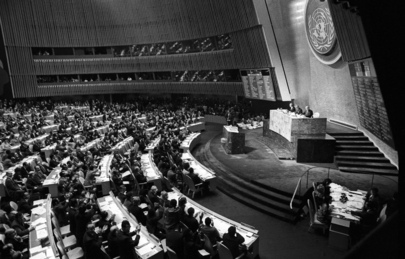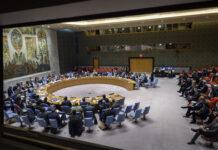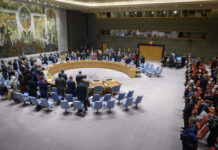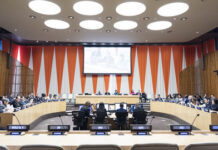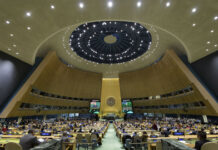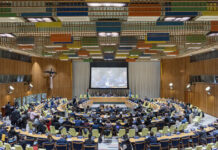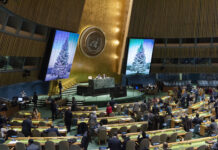This is the News in Brief from the United Nations.
Gaza: Fewer than 1 in 4 aid missions given green light, says OCHA
Israeli authorities have continued to block lifesaving aid from reaching northern Gaza, 102 days since Hamas-led terror attacks triggered the war, UN humanitarians reiterated on Tuesday, as UN Secretary-General António Guterres warned “the long shadow of starvation” stalks the people of Gaza.
In the first two weeks of the year, only seven out of 29 planned missions “to deliver food, medicine, water and other lifesaving supplies successfully reached their destinations north of Wadi Gaza,” according to the Office for the Coordination of Humanitarian Affairs (OCHA).
Echoing those concerns and highlighting the dire situation everywhere in the enclave, OCHA worker Olga Cherevko said that conditions were awful for those displaced in the south of Gaza, too.
“Some people have not eaten in days,” she said on Tuesday in a video posted on X, formerly Twitter. “The children have no winter clothes. There’s no medical care. […] The extent of needs is enormous,” she added.
In its latest update on the war on Sunday evening, OCHA noted that most of the Israeli denials involved fuel and medicines allocated for reservoirs, water wells and health facilities in the north.
Sudan conflict passes sad milestone as UN rights office urges ceasefire
To Sudan now, and a call on Tuesday from the UN’s human rights chief Volker Türk to the warring parties there to lay down their weapons immediately.
It’s been nine months since heavy fighting erupted between the Sudanese Armed Forces and the paramilitary Rapid Support Forces , and more than 7.4 million have been displaced inside the country.
That number increased by 611,000 in just the last month, as conflict uprooted communities from Aj Jazirah and other states.
On behalf of the UN High Commissioner for Human Rights, spokesperson Ravina Shamdasani said that the conflict has had a devastating impact in terms of numbers killed amid “ongoing concerns” about sexual violence and many other human rights violations:
“The High Commissioner, has been very clear in his call to all parties to cease hostilities and to ensure the protection of civilians, to take all feasible precautions, to minimize, in any case, harm, including attacks on civilians and civilian objects, to release all those who are arbitrarily detained, to immediately cease the use of landmines and other explosive ordnance that is clearly prohibited.”
Humanitarians have expressed alarm that the fighting has extended into central and eastern Sudan as these are the country’s main crop producing regions.
Insecurity, looting, bureaucratic impediments, poor network and phone connectivity, lack of cash, and limited technical and humanitarian staff are affecting the delivery of aid, said coordination office OCHA.
WHO calls for urgent regulation of e-cigarettes use by children
Societies are losing the battle against e-cigarettes whose use by children is now a “huge” and “alarming trend”, the UN World Health Organization (WHO) said on Tuesday.
In a call for concrete measures by governments to take far more restrictive measures against the tobacco industry, the WHO warned that there has been a double-digit increase in e-cigarette use “in many countries” in the last four to five years, because of lax regulation.
Up to 95 per cent of e-cigarettes can be adjusted to deliver more nicotine to users, said WHO’s Dr Ruediger Krech. Here he is now, speaking in Geneva:
“We have teachers calling us, especially in the UK, where you saw a 150 per cent increase in the last three years of uptake of e-cigarettes by children; so, they call us and say that children cannot stay a whole 45-minute lesson anymore, because they need to step out to get, you know, e-cigarettes.”
The WHO official maintained that the tobacco industry’s sales tactic was to “swamp the market” with up to 3,000 new devices every month – something that “no regulatory authority in the world…could deal with because you need to regulate them one by one”, Dr Krech said.
He also warned that Africa was now the tobacco industry’s “target continent” and that it was promoting tobacco growing there to get young people hooked on nicotine. “Once they recruit their victims, they know that they might have them for a longer period of time,” he said.
Daniel Johnson, UN News.
Source of original article: United Nations (news.un.org). Photo credit: UN. The content of this article does not necessarily reflect the views or opinion of Global Diaspora News (www.globaldiasporanews.com).
To submit your press release: (https://www.globaldiasporanews.com/pr).
To advertise on Global Diaspora News: (www.globaldiasporanews.com/ads).
Sign up to Global Diaspora News newsletter (https://www.globaldiasporanews.com/newsletter/) to start receiving updates and opportunities directly in your email inbox for free.


